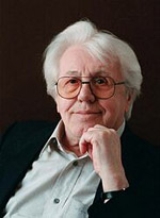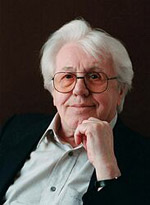
András Süto
Encyclopedia

Romania
Romania is a country located at the crossroads of Central and Southeastern Europe, on the Lower Danube, within and outside the Carpathian arch, bordering on the Black Sea...
, one of the leading Hungarian writers in the 20th century.
Early life and education
Sütő was born into a poor peasant family in CămăraşuCamarasu
Cămăraşu is a commune in Cluj County, Transylvania, Romania. It is composed of three villages: Cămăraşu, Năoiu and Sâmboleni.- Demographics :...
, in Cluj County
Cluj County
Cluj ; is a county of Romania, in Transylvania, with the capital city at Cluj-Napoca.-Demographics:In 2007, it had a population of 692,316 and a population density of 104/km².*Romanians – 80%*Hungarians – 17.5%*Roma – 2.5%-Geography:...
, Transylvania
Transylvania
Transylvania is a historical region in the central part of Romania. Bounded on the east and south by the Carpathian mountain range, historical Transylvania extended in the west to the Apuseni Mountains; however, the term sometimes encompasses not only Transylvania proper, but also the historical...
. He received his primary and secondary school education in the Reformed College of Aiud
Aiud
Aiud is a city located in Alba county, Transylvania, Romania. The city has a population of 28,934 people. It has the status of municipality and is the second-largest city in the county, after county seat Alba Iulia. The Aiud administrative region is 142.2 square kilometres in area.- Administration...
and in the Reformed gymnasium
Gymnasium (school)
A gymnasium is a type of school providing secondary education in some parts of Europe, comparable to English grammar schools or sixth form colleges and U.S. college preparatory high schools. The word γυμνάσιον was used in Ancient Greece, meaning a locality for both physical and intellectual...
in Cluj
Cluj-Napoca
Cluj-Napoca , commonly known as Cluj, is the fourth most populous city in Romania and the seat of Cluj County in the northwestern part of the country. Geographically, it is roughly equidistant from Bucharest , Budapest and Belgrade...
. After secondary school, he studied Stage Directing
Theatre direction
A theatre director or stage director is a practitioner in the theatre field who oversees and orchestrates the mounting of a theatre production by unifying various endeavours and aspects of production...
at the Szentgyörgyi István College of Dramatic Arts in Cluj.
He quit college in order to become the editor in chief
Editor in chief
An editor-in-chief is a publication's primary editor, having final responsibility for the operations and policies. Additionally, the editor-in-chief is held accountable for delegating tasks to staff members as well as keeping up with the time it takes them to complete their task...
of the Falvak Népe weekly. He moved to Bucharest
Bucharest
Bucharest is the capital municipality, cultural, industrial, and financial centre of Romania. It is the largest city in Romania, located in the southeast of the country, at , and lies on the banks of the Dâmbovița River....
in 1951 because the editorial office was relocated there. Sütő could not identify himself with the political environment of the 1950s in the capital and returned to Transylvania in 1954. He lived and worked in Târgu Mureş (Hungarian: Marosvásárhely) until near the end of his life.
Sütő was Member of the Great National Assembly
Great National Assembly
The Great National Assembly was the legislature of the Romanian People's Republic and the Socialist Republic Romania. When Communism was overthrown in Romania in December 1989, the National Assembly was replaced by a bicameral parliament, made up of the Chamber of Deputies and the Senate.The Great...
, the parliament of Communist Romania
Communist Romania
Communist Romania was the period in Romanian history when that country was a Soviet-aligned communist state in the Eastern Bloc, with the dominant role of Romanian Communist Party enshrined in its successive constitutions...
, between 1965 and 1977. He also served as vice-president of the Writers' Association of Romania
Writers' Union of Romania
The Writers' Union of Romania , founded in March 1949, is a professional association of writers in Romania. It also has a subsidiary in Chişinău, Republic of Moldova...
between 1974 and 1982.
In the late years of the Nicolae Ceauşescu
Nicolae Ceausescu
Nicolae Ceaușescu was a Romanian Communist politician. He was General Secretary of the Romanian Communist Party from 1965 to 1989, and as such was the country's second and last Communist leader...
regime, the works of András Sütő had been gradually banned from publication and presentation. Consequently, between 1980 and 1989 he could publish only in Hungary
Hungary
Hungary , officially the Republic of Hungary , is a landlocked country in Central Europe. It is situated in the Carpathian Basin and is bordered by Slovakia to the north, Ukraine and Romania to the east, Serbia and Croatia to the south, Slovenia to the southwest and Austria to the west. The...
. During this period, he and his family were constantly harassed by the authorities and the Securitate
Securitate
The Securitate was the secret police agency of Communist Romania. Previously, the Romanian secret police was called Siguranţa Statului. Founded on August 30, 1948, with help from the Soviet NKVD, the Securitate was abolished in December 1989, shortly after President Nicolae Ceaușescu was...
.
He had his eye gouged out during the 1990 ethnic clashes of Târgu Mureş
Ethnic clashes of Târgu Mures
Târgu Mureş is a town in Romania with an ethnically mixed population that was almost equally distributed between Romanians and Hungarians after the fall of the communist regime in December 1989. In March 1990, short-lived, but violent clashes occurred there between the two ethnic groups in the...
, and had to undergo treatment in Hungary. Sixteen years later, he died in Budapest
Budapest
Budapest is the capital of Hungary. As the largest city of Hungary, it is the country's principal political, cultural, commercial, industrial, and transportation centre. In 2011, Budapest had 1,733,685 inhabitants, down from its 1989 peak of 2,113,645 due to suburbanization. The Budapest Commuter...
, where he was under medical supervision.
Works
His first work (A Letter to a Romanian Friend) was published by the Hungarian-language Világosság journal in Cluj, when he was 18.Some of his several dozen novels and dramas:
- Mezítlábas menyasszony (drama) Bucharest, 1950
- Félrejáró Salamon (novel) Târgu Mureş, 1956
- Pompás Gedeon (drama) Bucharest, 1968
- Anyám könnyű álmot ígér (novel) Bucharest, 1970
- Egy lócsiszár virágvasárnapja (drama) Bucharest, 1975
- Advent a Hargitán (drama) Budapest, 1987
- Szemet szóért (diary notes) DebrecenDebrecenDebrecen , is the second largest city in Hungary after Budapest. Debrecen is the regional centre of the Northern Great Plain region and the seat of Hajdú-Bihar county.- Name :...
, 1993 - Engedjétek hozzám jönni a szavakat (essay) Budapest, 1994
- Balkáni gerle (drama) Budapest, 1999

